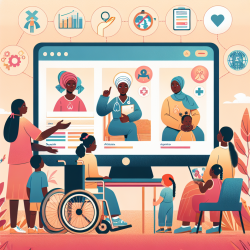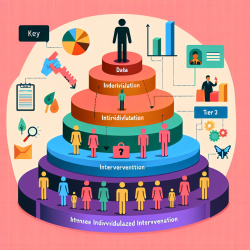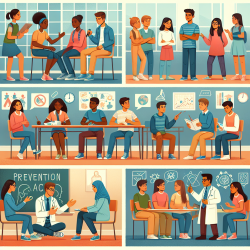As a practitioner dedicated to creating positive outcomes for children and young adults, it is essential to stay informed about the latest research and its implications. One recent study, "Examining access to sexual and reproductive health services and information for young women with disabilities in Senegal: a qualitative study," provides valuable insights that can help improve access to sexual and reproductive health (SRH) services for disabled women in Senegal.
The study identified several key barriers that disabled women face when accessing SRH services and information:
- Structural Barriers: Many health facilities lack wheelchair ramps, elevators, and accessible consultation tables, making it difficult for disabled women to receive proper care.
- Financial Barriers: The cost of SRH services is often prohibitive, and the carte d’égalité des chances, which is supposed to reduce these costs, is not always accepted or distributed in a timely manner.
- Long Wait Times: Extended wait times in health facilities can be particularly challenging for disabled women, who may find it exhausting to wait for hours to see a doctor.
- Transportation Difficulties: Health facilities are often far from where disabled women live, and public transportation is not always accessible or accommodating.
- Health Providers' Attitudes: Many disabled women feel judged and marginalized by health care providers, which can deter them from seeking necessary SRH services and information.
To address these barriers, practitioners can implement several strategies:
- Advocate for Structural Improvements: Work with local health facilities to ensure they are equipped with necessary accessibility features such as ramps, elevators, and accessible consultation tables.
- Financial Support and Education: Educate disabled women about their rights to financial support through the carte d’égalité des chances and advocate for its widespread acceptance and timely distribution.
- Streamline Services: Collaborate with health facilities to create priority lanes or appointment systems that reduce wait times for disabled women.
- Improve Transportation: Advocate for accessible public transportation options that can accommodate wheelchairs and other mobility aids.
- Training for Health Providers: Implement training programs for health care providers to improve their understanding and attitudes towards disabled women, ensuring they provide non-judgmental and respectful care.
By implementing these strategies, practitioners can help improve access to SRH services for disabled women in Senegal, ensuring they receive the care and information they need.
To read the original research paper, please follow this link: Examining access to sexual and reproductive health services and information for young women with disabilities in Senegal: a qualitative study.










